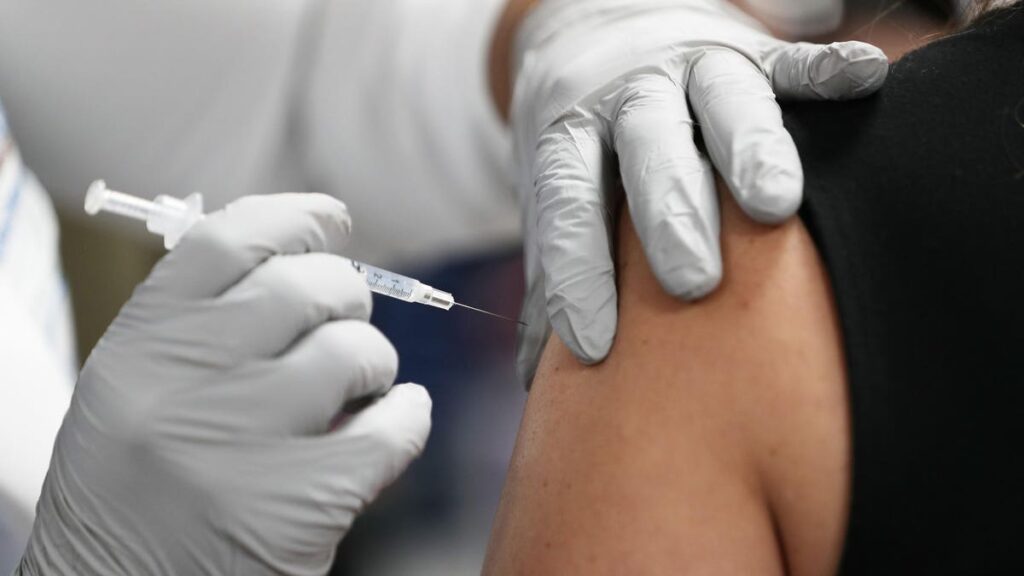Topline
New Covid boosters pending approval will only target the coronavirus’ Eris strain and other XBB subvariants, which make up most cases in the U.S., causing some experts to encourage patients to wait for the new shots instead of getting a current bivalent booster.
A healthcare worker gives a patient a Covid vaccine.
Key Facts
In June, a Food and Drug Administration panel recommended Pfizer, Moderna and Novavax formulate their new Covid booster shots to be monovalent and only protect against the XBB.1.5 variant and other XBB sublineages—as opposed to the currently available shots, which were designed to combat earlier coronavirus strains.
The companies are still awaiting FDA approval: The new vaccines are estimated to be ready by late September but probably won’t be widely available until October, CBS News reports.
XBB.1.5 (also known as “Kraken”) is a descendent of the omicron variant and was the most dominant strain in the U.S. earlier this year, but is now the eighth dominant strain.
The reason the FDA recommended monovalent boosters that protect against one strain is because most of the circulating variants are XBB descendants—as of June, over 95% of the Covid variants in the U.S. were XBB sublineages, the agency said in its report.
EG.5 or “Eris” is an XBB subvariant and the dominant strain in the U.S., accounting for 20.6% of all cases in the U.S. between August 6 and 10, according to the Centers for Disease Control and Prevention.
The second most common variant, FL.1.5.1, made up 13.3% of cases in the country within that same time period and is also an XBB subvariant.
On Thursday, Moderna said its new Covid vaccine generated a “robust immune response” against Eris and other XBB variants.
A report published in Nature Medicine found that although any available booster offers good protection against Covid, variant-specific shots—like the new monovalent XBB ones awaiting approval—offer about 1.6 times more immunity.
Big Number
676,728,782. That’s how many vaccines have been administered in the U.S. according to CDC data. However, only 17% of the population has received an updated bivalent booster.
Key Background
Some experts believe that since the new vaccines expected to release this fall are specifically aimed at targeting XBB variants, Americans should hold off on getting updated boosters until then. Paul Sax, the clinical director of the division of infectious diseases at Brigham and Women’s Hospital, told the New York Times that “waiting makes more sense” for most people looking to get a new vaccine. The current booster is a bivalent shot designed to protect against omicron subvariants BA.4 and BA.5, which were once the dominant strains in the U.S. but now make up less than 1% of cases combined. A January study conducted by the CDC found the bivalent vaccines were about 50% effective at protecting against XBB and XBB.1.5 in most adults and about a third effective in those 65 years and older. Raina MacIntyre, head of the biosecurity program at the medical research organization the Kirby Institute, told the Sydney Morning Herald the available bivalent boosters “do not provide enough protection against EG.5.1, but the XBB subvariant boosters that are being made by most companies will protect against EG.5.1.” Similarly, University of Michigan infectious disease expert Preeti Malani told NPR the updated booster shots “will provide a better match to the currently circulating variants,” so most patients are better off waiting for it to be approved.
Contra
The CDC still recommends that most people receive at least one bivalent booster shot. The agency first signed off on Pfizer and Moderna’s updated boosters almost a year ago.
Tangent
A new Covid variant called BA.2.86, or “Pirola,” was labeled as a variant under monitoring by the World Health Organization on Thursday due to the “large number of mutations it carries.” That same day, the CDC said it was monitoring the variant as it’s been reported in the U.S., Israel and Denmark. It is the descendant of omicron subvariant BA.2, which was the dominant strain in the U.S. earlier this year, at one point making up 85% of cases in the country. An analysis by Jesse Bloom, an evolutionary biologist at Fred Hutch Cancer Center, found the variant had 36 additional spike protein mutations than XBB.1.5 and 34 more mutations than BA.2. The number of mutations BA.2.86 has in comparison to other variants makes it “comparable to [the] number of mutations in [the] first Omicron strains relative to” the original Covid strain, according to Bloom. Although its prevalence in the U.S. isn’t large enough to appear on the CDC’s variant tracker—it’s being lumped in with BA.2 cases—there might be concern that the new monovalent vaccines won’t protect against it because it’s not an XBB variant. However, in a report shared with Forbes, Pfizer-BioNTech said evidence shows their new monovalent boosters should offer some protection against BA.2.86.
Further Reading
What We Know About ‘Eris’ Covid Variant EG.5: The Dominant Strain Driving An Uptick In Cases (Forbes)
Don’t Get Your Next Covid Booster Quite Yet (New York Times)
Covid Vaccines: Here’s Evidence They Work—Despite Persistent Misinformation—Along With Side Effects And Common Misconceptions (Forbes)


